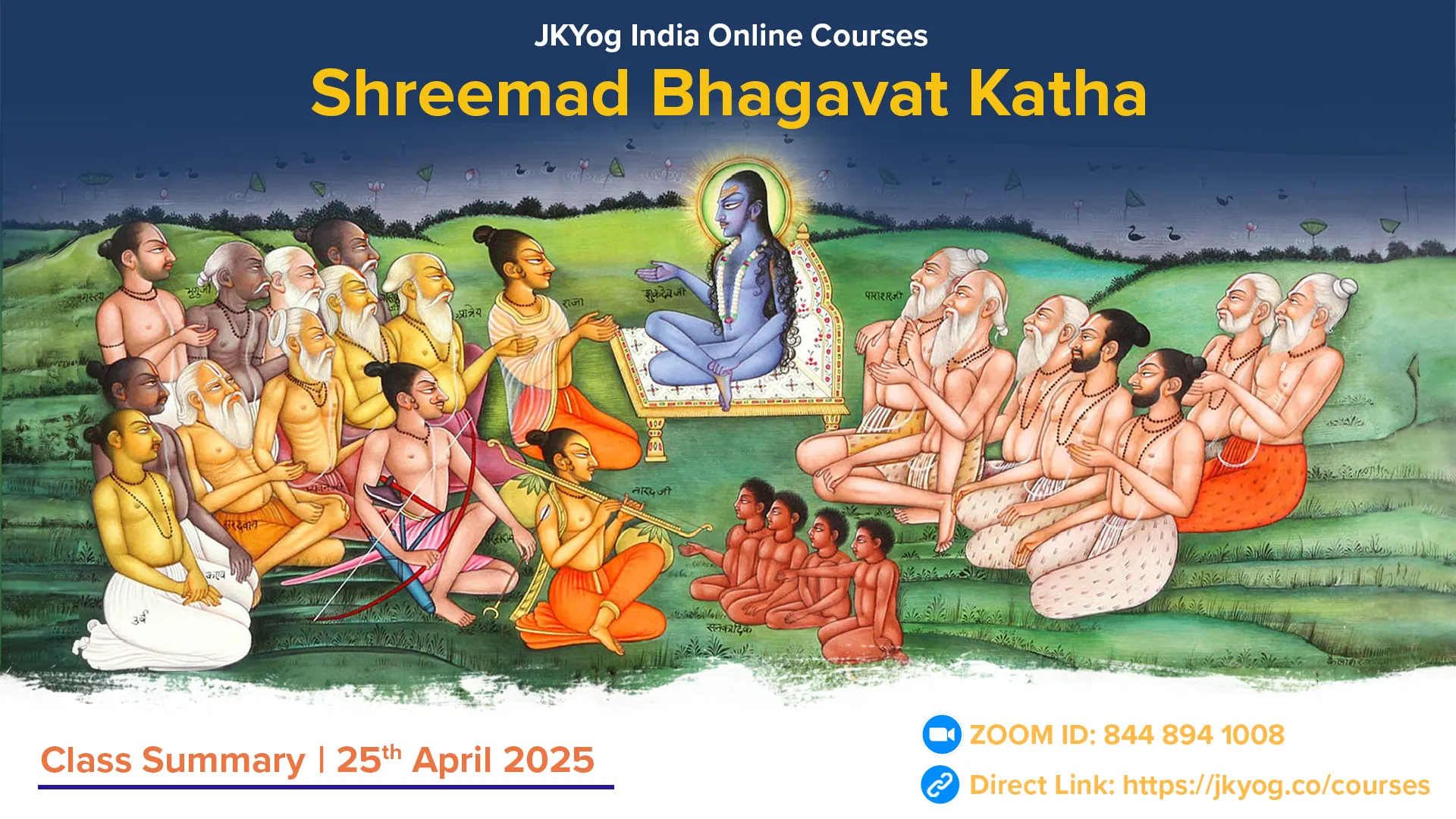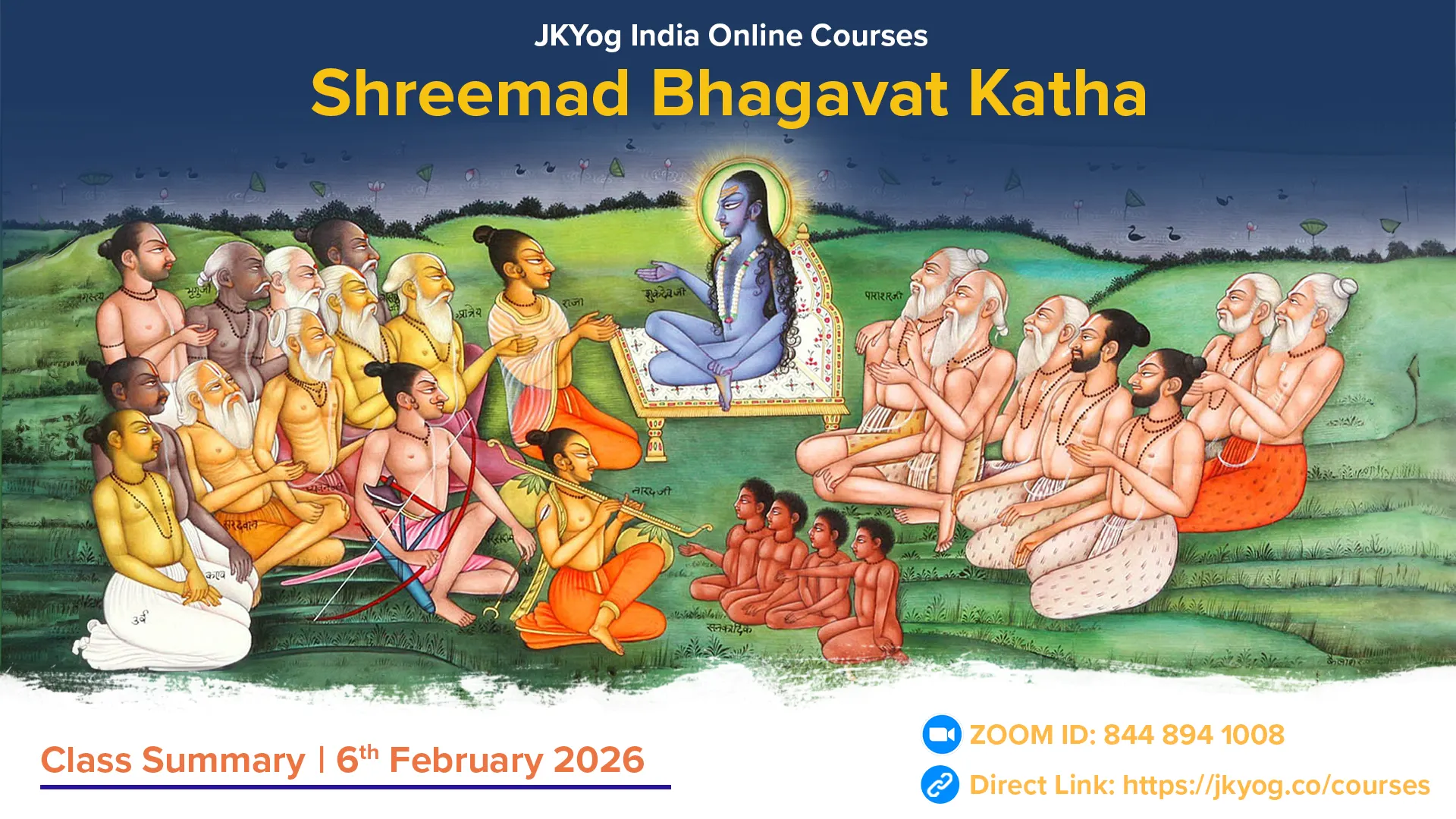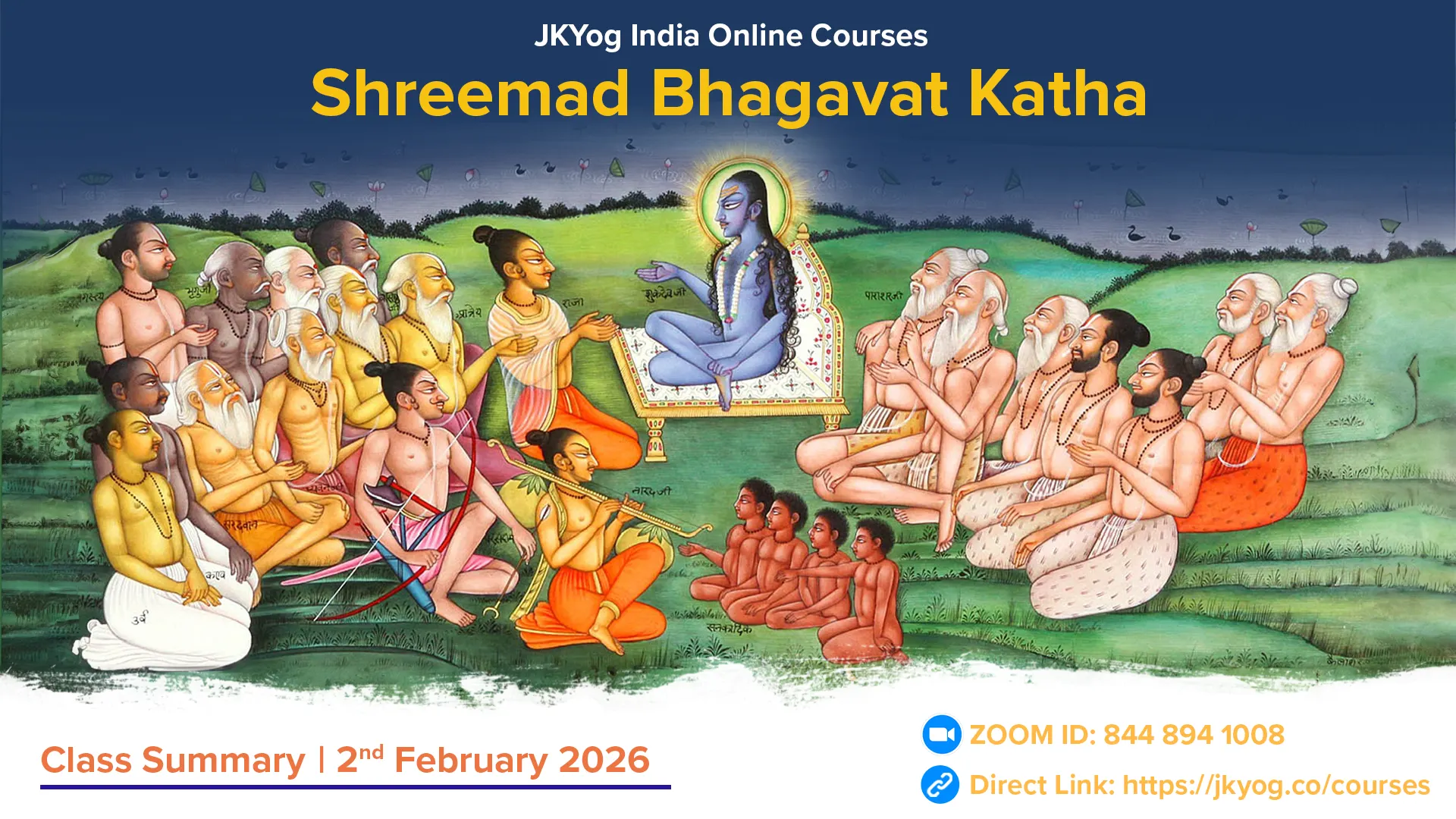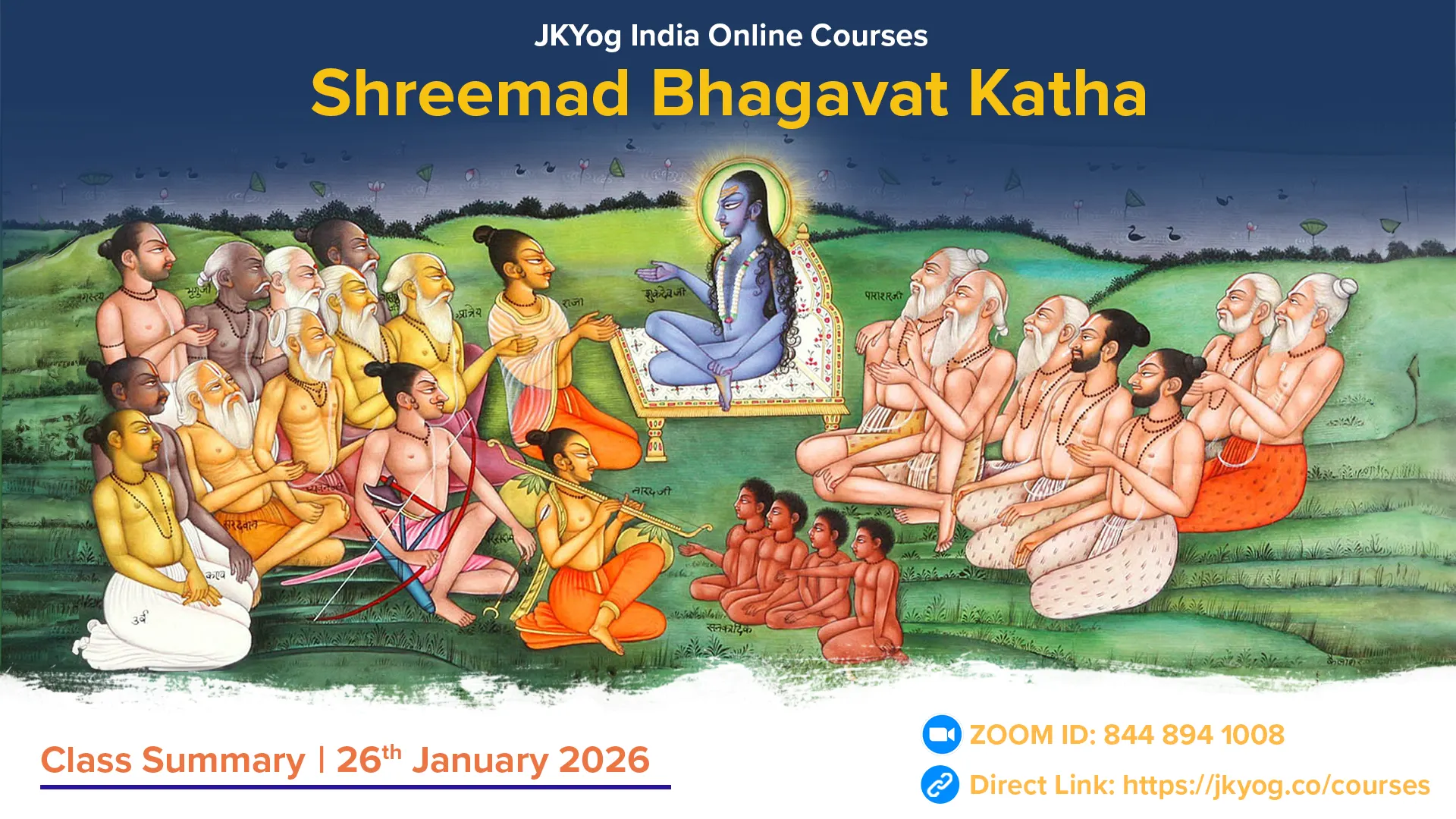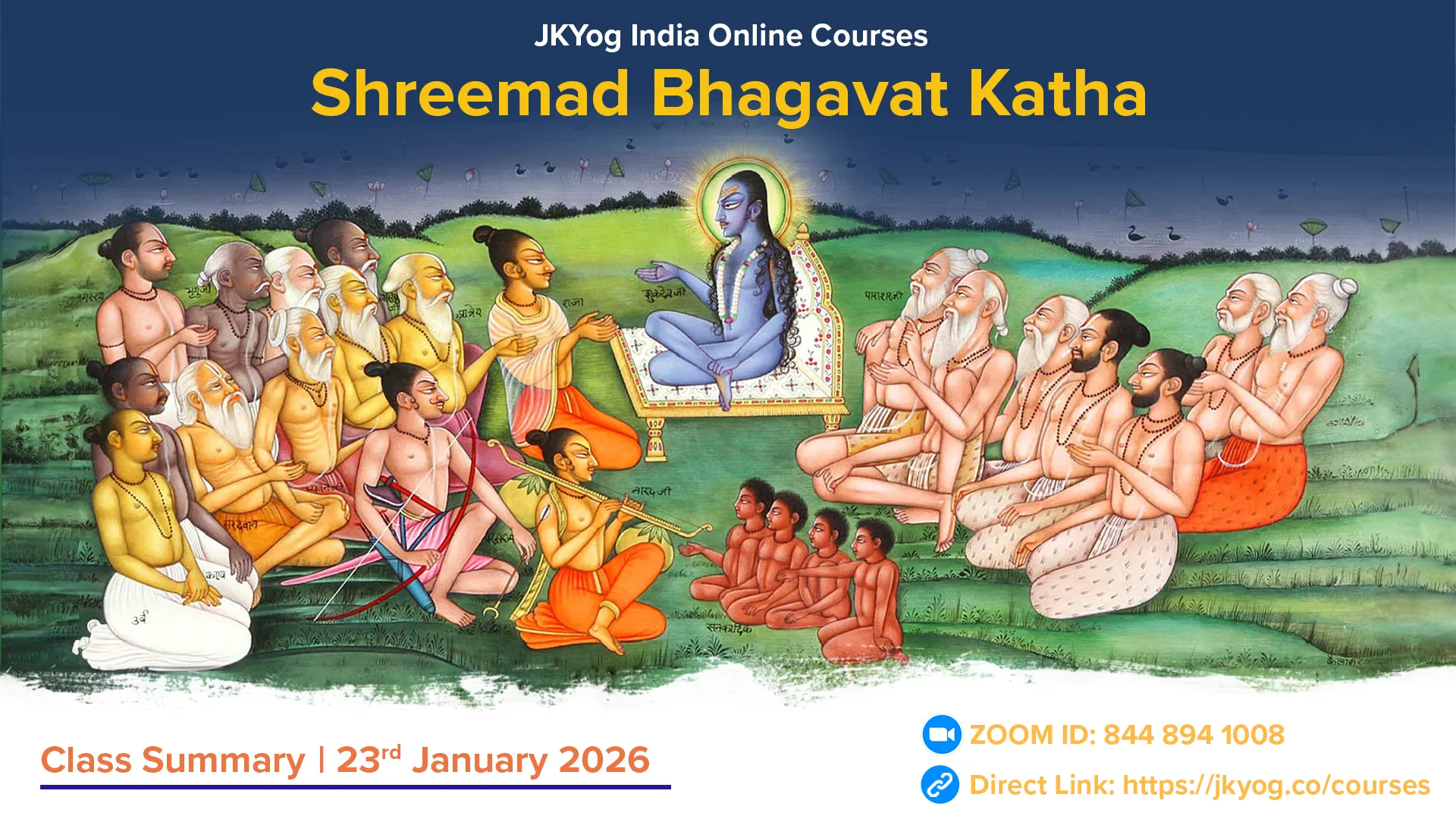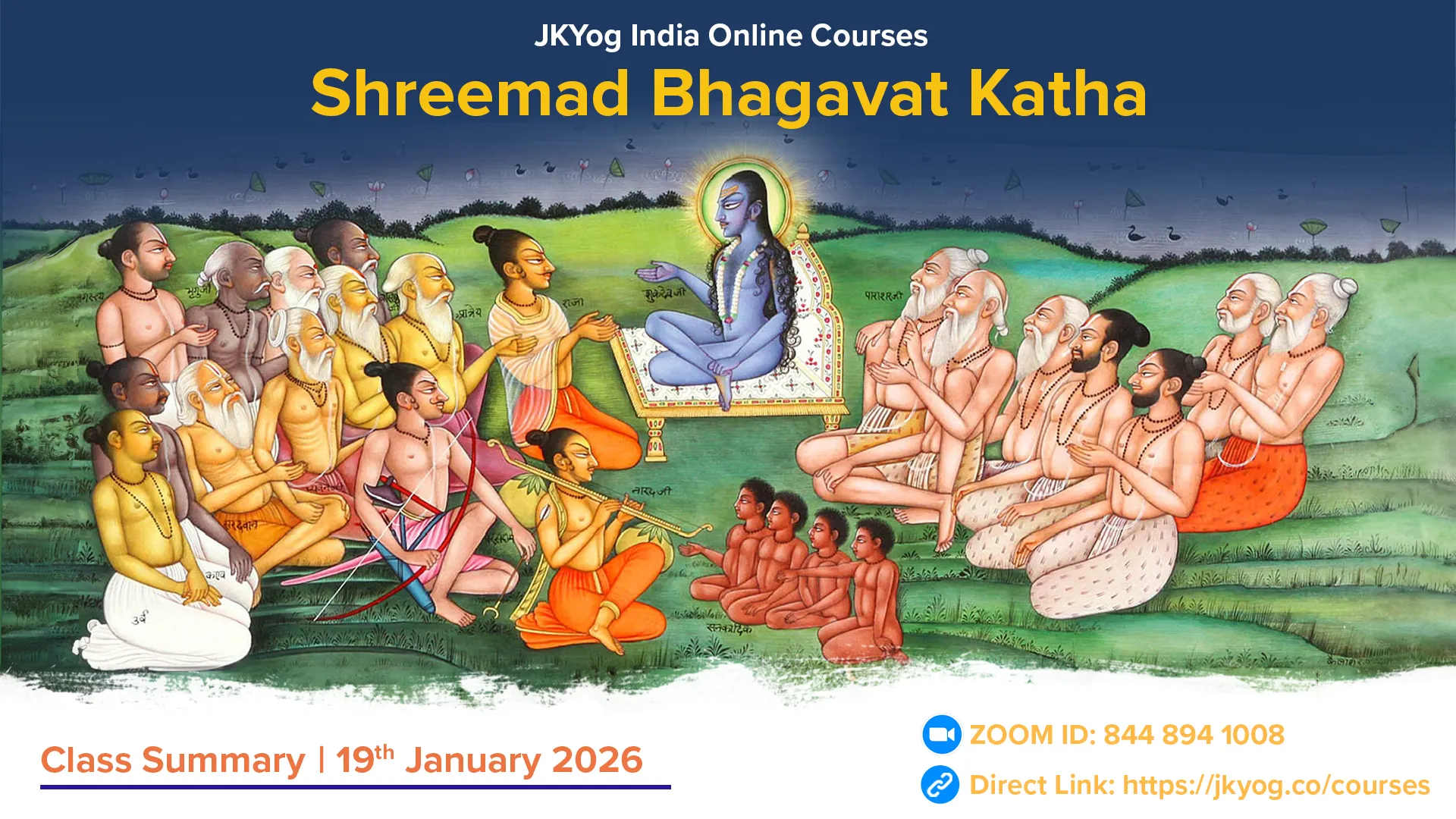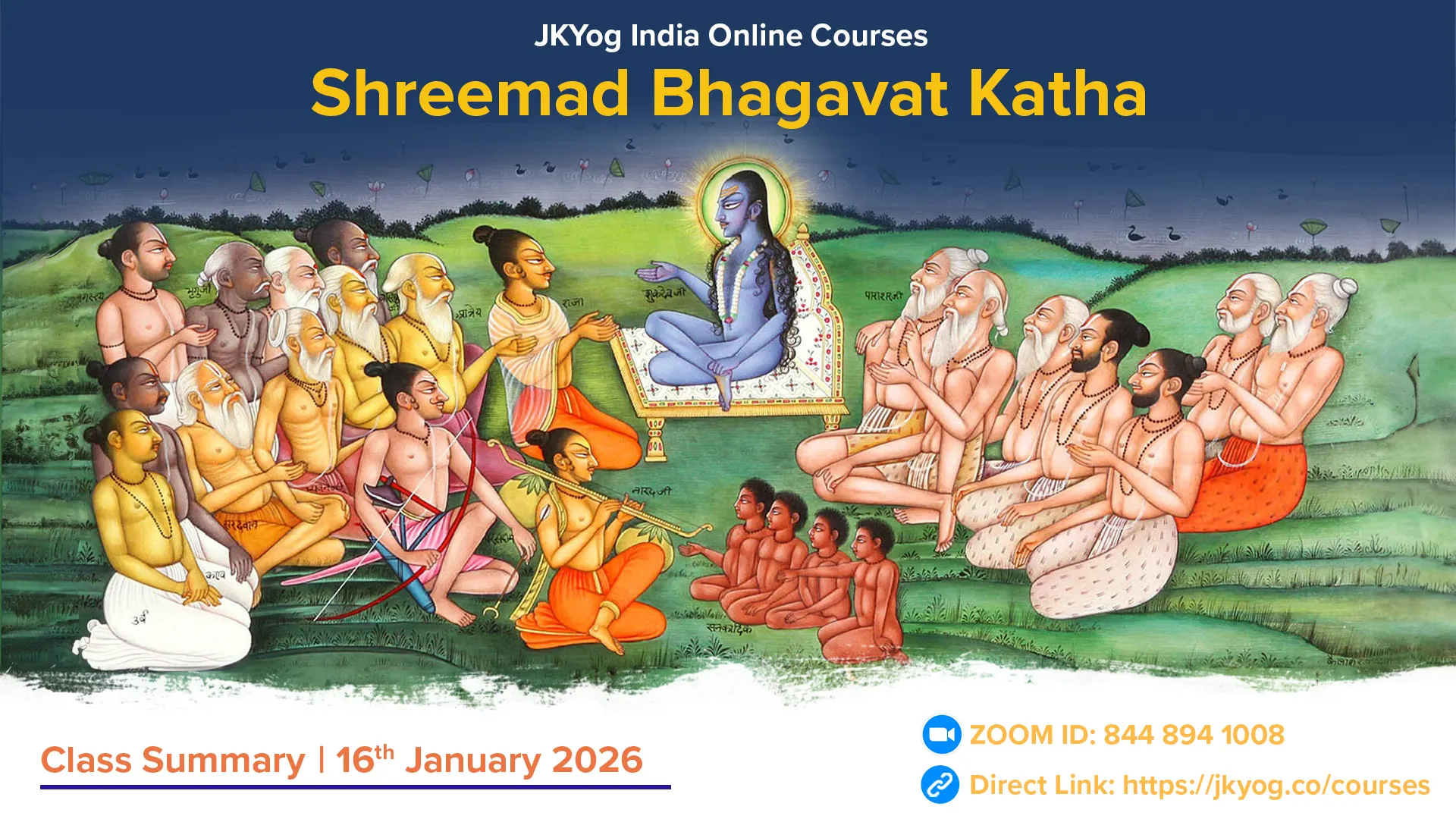Shreemad Bhagavat Mahapuran- Canto: 6, Chapters: 14-16
King Parikshit asks Shree Shukadevji with folded hands, "Bhagavan! Vritrasur is known to be a sinful being, filled with rajas and tamas—the qualities of passion and ignorance. Yet, how does he develop such exclusive, unwavering devotion towards Bhagwan Shree Krishna? Even great devas and rishis often remain deprived of such pure love. In this world, only a handful seek liberation, and among millions, barely one becomes fully surrendered to Bhagwan. Then how does a sinner like Vritrasur display such deep devotion even at the time of a ferocious battle? O Master, this fills my heart with wonder and curiosity."
Hearing this, Shree Shukadevji replies, "Parikshit, listen carefully. I have heard this sacred history from my father, Maharishi Vyas, and from great souls like Naradji and Devalji. Long ago, in the land of Shursen, a mighty emperor named King Chitraketu ruled over the Earth. Under his reign, the Earth herself generously yielded her bounty. He was blessed with wealth, beauty, learning, and immense power. Yet, despite having one crore (ten million) queens, none bore him a child. Beneath his royal splendour, King Chitraketu harboured a deep sorrow—the yearning for an heir."
One day, by divine will, Sage Angira arrived at his palace. The king welcomed him with great reverence and devotion. Sage Angira blessed him and gently inquired, "O King, were you well and thriving with your guru, ministers, kingdom, forts, treasury, army, and allies? Just as a soul is enveloped by layers of coverings, a king, too, is surrounded by these seven elements. Only one who has conquered his mind can be called a true ruler. But I see unrest within you. Some deep longing still troubles your heart."
Though Sage Angira already knew everything, he compassionately prompted the king to speak. With folded hands and great humility, King Chitraketu revealed his heart, "O great one! You are the knower of all—within and without. I have been blessed with sovereignty and prosperity, yet my heart remains empty without a son. Just as food alone can satisfy the hungry, similarly, my soul finds no joy in riches or power. My ancestors, too, remain in distress, deprived of sacred offerings. Kindly bless me with a son and free me from the suffering of both this world and the next."
Moved by the king's earnest prayer, Sage Angira performed a sacred yajna (ritual) and blessed queen Kritadyuti with consecrated prasada. Smiling, he said, "You shall be blessed with a son, but remember—he will bring you both immense joy and profound sorrow."
True to the sage's words, Kritadyuti soon conceived and gave birth to a radiant, beautiful son. The entire kingdom erupted in celebration. Brahmanas were honoured, gifts were distributed, and auspicious rituals were conducted. King Chitraketu's heart overflowed with love for his child and for queen Kritadyuti. However, the other queens, who remained barren, became consumed by jealousy. Their hearts, once loyal, darkened with envy and spite. Blinded by resentment, the queens conspired and, in a tragic act of cruelty, poisoned the innocent child.
When Kritadyuti entered the royal nursery, her heart shattered at the sight of her lifeless son. Overwhelmed by grief, she collapsed, her garments dishevelled and her hair undone. Hearing her anguished cries, the other queens and the palace attendants rushed to the scene. The very queens who had committed the heinous act now pretended to weep alongside her.
The devastating news reached King Chitraketu. Stricken with unbearable grief, he fainted beside the child's body. Regaining consciousness, he wept bitterly. Queen Kritadyuti, her heart torn with sorrow, cried out to the heavens, "O merciless fate! How unjust you were to snatch away innocent children! You had orphaned me! My dear son, open your eyes—look at your grieving father. Without you, our lives were plunged into darkness."
Her tears smudged the kajal down her cheeks, her once-flowering hair scattered wildly. Clutching her child's tiny, lifeless body, she sobbed, "My darling, wake up now, eat something. Would I never again hear your sweet, lisping words? Would your radiant smile never light up my world again?"
Angira and Narad Consols Chitraketu with Divine Wisdom
King Chitraketu, overwhelmed by sorrow, began to weep uncontrollably. The entire kingdom was engulfed in mourning. At that moment, Sage Angira and Sage Narad appeared before the king in their divine, formless state and began to console him with profound words.
"Why are you mourning so deeply, O King?" they asked. "This child—who was he to you in this birth and in past births? Who were you to him? And what relation will you have with him in future births? Just as grains of sand in a flowing river come together and then part, so too does the meeting and separation of souls in this world. Like seeds that give rise to new seeds and are eventually destroyed in time, souls are born and die, all under the influence of divine maya."
They continued, "You, I, and all the creatures of this world—both moving and non-moving—did not exist before birth, and we will not exist after death. The object that is bound by birth and death is not the 'Truth' because the Truth is that which remains unchanged in all circumstances, at all times. There is only one entity that is eternal and unchanging—God. He is neither born nor destroyed, and He undergoes no change. He has no desires or expectations. Yet, out of His will, He creates, sustains, and destroys life, just as a child builds and destroys clay houses while playing."
"Just as one seed gives rise to another, so too does the body of a son arise from the bodies of the father and mother. Father, mother, and son are all embodied beings, and the body is only an external form. The difference between the body (deha) and the soul (dehi) is just an illusion of ignorance, arising from an eternal misunderstanding."
Sage Angira and Sage Narad's words slowly began to calm the sorrowful king. With great effort, King Chitraketu wiped his tears and spoke, "You two are great sages possessing divine knowledge. You have come in your formless state to guide me. Please tell me—who are you? I know that many beloved knowers of God, such as Sanatkumar, Narad, Ribhus, Angira, Devala, Vyasa, Markandeya, Gautama, Vasistha, Parashurama, Kapiladeva, Shukadeva, Durvasa, Yajnavalkya, Dattatreya, and others, travel across the Earth to impart knowledge. I, who am entangled in worldly desires, foolish and submerged in the darkness of ignorance, seek your guidance. Please enlighten me and free me from this ignorance."
Sage Angira responded with compassion, "O King, when you were longing for a son, I granted your wish and gave you a child. I am Angira, and this is Sage Narad. We have seen that you have become submerged in the darkness of ignorance due to the grief of your son's death. That is why we have come here to bestow our grace upon you. A true devotee of God and Guru should never indulge in sorrow. In the past, your heart longed for a son, and so, I gave you a son instead of wisdom. Now, you are realising that it is the attachment to the son that has brought you sorrow, just as worldly attachments bring only pain and suffering. The body and its pleasures are the source of misery and grief. You must calm your mind and immerse yourself in the Supreme Being."
With these words, King Chitraketu was slowly brought to a state of peace, his grief alleviated by the wisdom imparted by the great sages.
Chitraketu's Son's Soul Teaches the Impermanence of Worldly Relationships
Shree Shukdevji says: "Parikshit, thereafter, Devarshi Narad summoned the soul of the deceased prince in front of his grief-stricken family members. He said, 'O soul, may you be blessed! Look, your parents and well-wishers are in great sorrow due to your separation. Therefore, return to your body and live the remainder of your life with your loved ones. Enjoy the pleasures provided by your father and sit on the royal throne.'
The soul replied, 'O Devarshi! I have been wandering through various species—devas, humans, animals, birds, and many other forms—for countless lifetimes, according to my karmas. Among all these births, in which one were these people, my parents? In different lives, we are brothers, friends, enemies, neutrals, or even hostile. Just as goods like gold and other commodities are exchanged from one merchant to another, similarly, the soul takes birth in different species over time.
When I reflect on this, I realise that even the relationships with objects like gold, which are more permanent than human life, are also transient and temporary. As long as one is attached to an object, there remains a bond, but once that bond is severed, attachment ceases. The soul is eternal, free from ego. It does not consider itself as part of the body it occupies. The soul is indestructible, subtle, and the shelter of all beings, and it is self-illuminating. It has neither a very dear nor an undesirable attachment to anything, and it is not bound by notions of 'mine' or 'others.'
The soul is a witness to all the qualities and faults. This soul observes the actions and consequences of karma but remains unaffected by them. It remains ever indifferent, unaffected by the qualities and actions of the body it temporarily resides in.'
Shree Shukdevji continues: 'Saying this, the soul departed, leaving the family astonished. Their attachment was severed, and their grief came to an end. They performed the appropriate rituals for the body and renounced their attachment. The queens, who had poisoned the child, were filled with shame and regret for their sinful act. They went to the banks of the Yamuna and atoned for their actions through penance.'
Naradji Imparts the Fourfold Form Mantra to King Chitraketu
Thus, by the teachings of Angira and Naradji, King Chitraketu's wisdom was awakened. He emerged from the dark well of worldly attachments, just as an elephant emerges from the mud of a pond. He bathed in the holy Yamuna River with proper rituals, performing offerings and other religious rites.
Seeing that King Chitraketu had become self-controlled, a devotee of Bhagwan, and surrendered to the divine, Naradji was greatly pleased. With joy, Naradji imparted the Chaturvyaktirup (fourfold form) mantra to him, a sacred and powerful teaching.
Om namas tubhyam bhagavate vasudevaya dhimahi
Pradyumnay aniruddhay namah sankarshanaya cha
“O God, embodiment of Om! You are the presiding deities of the mind, intellect, ego, and consciousness in the forms of Vasudev, Pradyumna, Aniruddha, and Sankarshan, respectively. I repeatedly meditate on Your fourfold form with utmost reverence.” (Bhagavat 6.16.18)
Devrishi Narad, while meditating upon the Chaturvyaktirup form of Bhagwan (Vasudev, Pradyumna, Aniruddha, and Sankarshan), offered his heartfelt salutations. He described Bhagwan as the source of pure knowledge, bliss, and peace, who is both all-pervading and beyond manifestation. Naradji emphasized that Bhagwan's form transcends the mind, intellect, senses, and actions. He is the one who remains beyond the cycle of cause and effect, unique and the embodiment of pure consciousness.
With profound devotion, Naradji continued to offer his repeated salutations to Bhagwan, affirming that Bhagwan is the supreme and His devotees are eternally immersed in the divine presence of His lotus feet. Through these words, Naradji expressed the highest reverence and surrender to Bhagwan, acknowledging Him as the ultimate reality and the eternal source of all creation.
Bhagwan Shankarshan gives divine vision and teachings to King Chitraketu
After receiving the teachings from Devrishi Narad, King Chitraketu practised the knowledge he had gained for seven days, which purified his mind. As a result, he was led to the divine form of Bhagwan Shankarshan, who was radiating supreme divinity. Upon seeing Bhagwan, all of Chitraketu's sins were washed away, and with intense devotion and love, he began to praise Him.
Chitraketu described Bhagwan as the all-pervading, immutable, and beyond the attributes of the material world. He acknowledged Bhagwan to be greater than even Brahma and the other deities. In his praise, King Chitraketu highlighted the glory of Bhagwat Dharma, which is distinct from materialistic pursuits and tied deeply to devotion, balance, and spiritual connection. It is Bhagwan's divine grace that governs the creation, preservation, and dissolution of the universe. Through His darshan (sight) and bhakti (devotion), all of a devotee's sins are eradicated.
Upon hearing this heartfelt praise, Bhagwan Shankarshan was pleased and spoke to King Chitraketu, saying, "Chitraketu! Through the teachings given to you by Devrishi Narad and Maharishi Angira, and by witnessing my divine form, you have truly attained the highest state of realisation."
Aham vai sarvabhutani bhutatma bhutabhavanah
Shabdabrahma param brahma mamobhe shashvati tanu
"I am present in the form of all living beings, I am their soul, and I am also their sustainer. Both the Shabdabrahman (the Vedas) and the Parabrahman are my eternal forms." (Bhagavat 6.16.51)
Bhagwan Sankarshan continued, "Both the soul and the world are under My divine influence, My maya. Just as a person in a dream perceives everything as existing within his own self, but upon waking, he realises that it was only an illusion. Similarly, the waking state of the soul is also governed by My maya. Understanding this truth, one should meditate on the Supreme Soul, the witness of all, who is beyond maya.
I pervade everything, and everything exists within Me. When the soul forgets My form, it begins to perceive itself as separate. This leads to the entanglement in the cycle of birth and death, experiencing one life after another. The human form of life is the root of both knowledge and wisdom. Those who, despite attaining it, fail to realise the Supreme Soul can never find peace in any form of existence."
He continued, "Efforts made to attain worldly pleasures result in exertion and suffering, and even the efforts made to attain the highest happiness often lead to the opposite—great sorrow. Therefore, one should not fear freeing oneself from the cycle of actions. The wise person should understand that no vow should be taken regarding any action or its outcome. People perform actions in hopes of attaining happiness and avoiding suffering, but such actions neither alleviate suffering nor bring happiness.
Those who consider themselves to be highly wise and yet remain trapped in the entanglement of actions only receive the opposite of what they seek. It is important to understand that the nature of the soul is very subtle, and it is distinct from the three states—waking, dreaming, and deep sleep. Understand that the pleasures of this world and the next are illusory, and by using discernment, free your mind from them. Be content with knowledge and wisdom, and become My devotee."
Bhagwan Sankarshan then said, "Those who are proficient in understanding the principles of Yoga should realise that the highest goal of the soul is to experience the oneness of Brahman and the self. O King! If you accept this teaching with faith and meditation, you will soon be fulfilled with knowledge and wisdom and attain the highest state."
Shree Shukdevji concludes, "After explaining this profound knowledge to King Chitraketu, Bhagwan Shree Hari, the Supreme Soul, disappeared into His divine form.
Afterwards, King Chitraketu, paying his respects to the direction where Bhagwan Sankarshan had disappeared, began to travel freely through the sky. He wandered through the valleys of Mount Sumeru for millions of years. His strength and vitality remained undiminished, and great sages, Siddhas, and Charanas continually praised him for his devotion and wisdom.
Summary: JKYog India Online Class- Shreemad Bhagavat Katha [Hindi]- 25.04.2025

